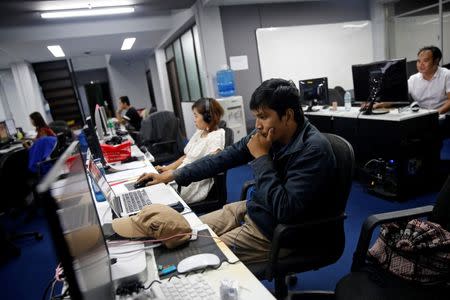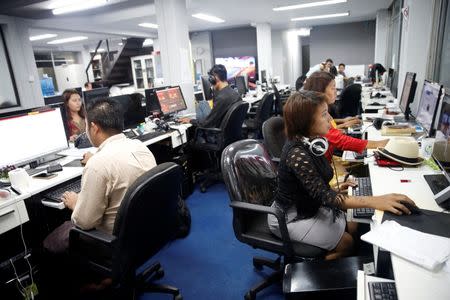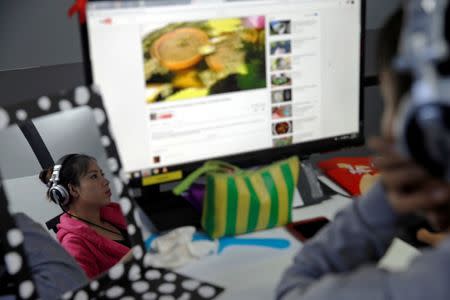"Just doing their jobs": Families decry case against Myanmar reporters
By Simon Lewis and Shoon Naing YANGON (Reuters) - Family and colleagues of three Myanmar journalists who face up to three years in prison on charges of contacting ethnic rebels appealed for their release on Thursday, in a case that has raised concerns about Myanmar's transition to democracy. The men have been accused of breaching the colonial-era Unlawful Associations Act after covering an event on Monday where the rebel Ta'ang National Liberation Army (TNLA) burned piles of narcotics to mark International Day Against Drug Abuse. "We don't really think our journalists have working relations with the TNLA group, which (the government) calls terrorists," said Than Win Htut, planning editor at the Democratic Voice of Burma (DVB), the employer of two of the journalists. "They are just doing a journalist's job." The TNLA, which demands more autonomy for the Ta'ang ethnic group, regularly clashes with government forces. Broadcaster DVB's Aye Nai and Pyae Phone Naing, and Lawi Weng of the Irrawaddy magazine, were remanded along with three others in Hsipaw prison, in northern Shan State, on Wednesday. They will be brought before a court on July 11, said Thein Zaw, head of the police station handling the case in the town of Hsipaw. Critics disappointed with Aung San Suu Kyi's first year in power say the case highlights the gaps in Myanmar's transition from military rule to full democracy. Suu Kyi's defenders say the Nobel Peace Prize winner - who spent years under house arrest for opposing Myanmar's junta - is hamstrung by a military-drafted constitution that keeps the generals in politics and free from civilian oversight. Suu Kyi's spokesman has said the journalists should be treated "according to the law". But Phil Robertson, deputy director for New York-based Human Rights Watch's Asia division, said Suu Kyi should use her majority in parliament to rein in the military. "It's hard to tell what Aung San Suu Kyi thinks, but if she believes she can convince the army to somehow reform or moderate their behaviour, this is more evidence to show that she's profoundly mistaken," he said. A RISKY RETURN The case has sparked outrage among the boisterous media that emerged in the commercial hub Yangon after the government lifted pre-publication censorship in 2012. Journalists will gather signatures on Friday calling for the release of the three men - and of an editor charged in a separate case with defamation over a satirical article mocking the army. Both DVB and the Irrawaddy were set up in exile in Thailand, receiving funding from Western governments and NGOs, and have opened bureaus in Yangon since 2012. Aye Nai, 53, and Lawi Weng, 38, returned to Myanmar to cover the conflicts between the army and ethnic rebels. Lawi Weng, a member of southern Myanmar's Mon ethnic minority, is a practicing Buddhist who meditates each morning and night. He had planned to marry this year. Loa Htaw, his fiancée, said Lawi Weng knew the risks his repeated trips to conflict areas entailed. "Both he and I (were) aware that he might face prison if he keeps writing about our ethnic armed groups and criticises the military and government," she wrote in a message to Reuters. However, "he needs to report for the voiceless and the powerless", Loa Htaw said. Part of the new generation of Myanmar journalists to emerge since the reforms, 24-year-old Pyae Phone Naing worked for several media organizations before joining DVB about four months ago, his father, Kyaw Soe Oo, told Reuters. On Monday evening, Pyae Phone Naing called his mother. He informed her that he was in a military camp, but not to worry, his father said. The parents did not realise the gravity of the situation until later, when relatives started calling having seen news reports of their son's detention. "It gives me pain in my heart. I always worry about him, even when he comes home late on usual days," Kyaw Soe Oo told Reuters. "I want my son to be released." (Reporting by Simon Lewis and Shoon Naing; Editing by Alex Richardson)

 Yahoo News
Yahoo News 


